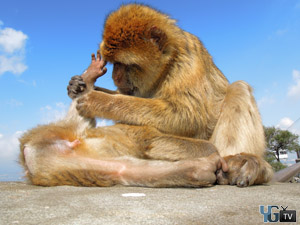Apr 20 - Gibraltar Monkeys Feature In International Scientific Research
 The results of a wide-ranging international research project on disease in free-ranging and captive macaques has just been published in the Journal of Emerging Infectious Diseases.
The results of a wide-ranging international research project on disease in free-ranging and captive macaques has just been published in the Journal of Emerging Infectious Diseases.
It is a collaboration between a number of scientists and includes Dr John Cortes, Gibraltar’s Minister for the Environment, as one of its authors.
The paper, Survey of Treponemal Infections in Free-Ranging and Captive Macaques, 1999–2012, analyses data from around the world in studying the prevalence of Yaws. Yaws is an endemic tropical disease distinguished by bone and skin lesions, is caused by infection with Treponema pallidum.
The overseas research bodies involved in this project include the University of Washington, Udayana University (Bali), University of Kent (Canterbury), the London School of Hygiene and Tropical Medicine, University of Toronto (Scarborough), and the German Primate Centre (Gottingen). The Gibraltar part of the research was carried out under the auspices of the Gibraltar Macaque Team, which is made up of Gibraltar Ornithological & Natural History Society, the Gibraltar Veterinary Clinic and the Department of Environment, Heritage and Climate Change. Samples from no fewer than 124 Gibraltar macaques were analysed, out of a total of 734 from different locations including Bali, Sulawesi, Nepal, Singapore, Bangladesh, Thailand and Cambodia. The Gibraltar macaques were all free from the infection.
Minister for the Environment Dr Cortes commented: “I am delighted that our macaques continue to be considered important in international research. We must remember their scientific importance and that they are much more than just tourist attractions. Significantly once again scientific research has shown that our animals are free from significant infection. Because as primates they are prone to human diseases, our policy of discouraging human/monkey contact is important, as it is much more likely that they can catch something from us that we can from them.”
The full text of the paper is available on line at the following link: https://wwwnc.cdc.gov/eid/article/23/5/16-1838
The University of Washington has issued a press release to mark the publication of this important research, giving its sicentific context. The full text of the university’s press release can be accsessed at this link: study http://www.washington.edu/news/2017/04/12/why-treating-animals-may-be-important-in-fighting-resurgent-tropical-disease/
{fcomment}






